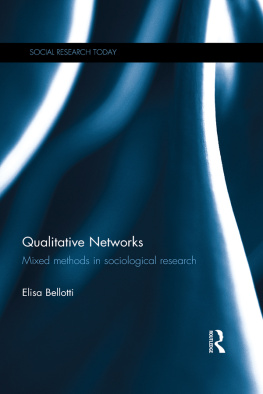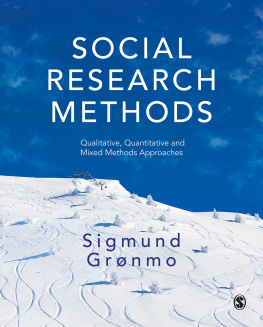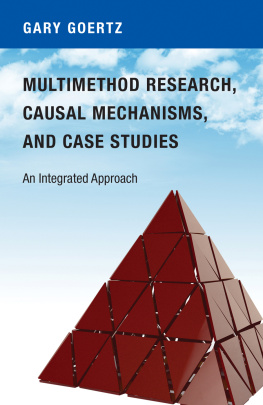Qualitative Networks
How do we interact with people in our everyday life? Who are the people we are connected to? What are the consequences of overlapping social circles and how people deal with the potential emerging conflicts? What are the structural and cultural mechanisms that regulate social worlds? Network science is a scientific approach to the study of network dependencies and associations which tries to answer these and many other questions. This book explores the underlying mechanisms that regulate social life as they are produced, reproduced, modified and abandoned in the spatial and temporal patterns of interactions. The mixed methods approach, that combines formal network analysis with qualitative materials and statistical tools, shows the importance of contextualising structural mechanisms in their social and cultural environment, and allows overcoming the traditional methodological boundaries that shape the field of social sciences.
Elisa Bellotti is Lecturer in Sociology at the University of Manchester and a member of the Mitchell Centre for Social Network Analysis. Before arriving in Manchester in 2008, she worked as Research Fellow at the University of Turin and the University of Bozen, Italy. She completed a PhD in Sociology and Methodology of Social Research in 2006 at the Catholic University of Milan. She publishes in international peer reviewed journals. Among her recent publications are: Getting funded: Multi-level networks of physicists in Italy (Social Networks, 2012) and the monograph Amicizie. Le reti amicali dei giovani single (Milan: Franco Angeli, 2008).
Social Research Today
Edited by Martin Bulmer
The Social Research Today series provides concise and contemporary introductions to significant methodological topics in the social sciences. Covering both quantitative and qualitative methods, this new series features readable and accessible books from some of the leading names in the field and is aimed at students and professional researchers alike. This series also brings together for the first time the best titles from the old Social Research Today and Contemporary Social Research series edited by Martin Bulmer for UCL Press and Routledge.
Other series titles include:
Principles of Research Design in the Social Sciences
Frank Bechhofer and Lindsay Paterson
Social Impact Assessment
Henk Becker
The Turn to Biographical Methods in Social Science
Edited by Prue Chamberlayne, Joanna Bornat and Tom Wengraf
Quantity and Quality in Social Research
Alan Bryman
Field Research
A sourcebook and field manual
Robert G. Burgess
In the Field
An introduction to field research
Robert G. Burgess
Qualitative Analysis
Thinking, doing, writing
Douglas Ezzy
Research Design (second edition)
Catherine Hakim
Measuring Health and Medical Outcomes
Edited by Crispin Jenkinson
Methods of Criminological Research
Victor Jupp
Information Technology for the Social Scientist
Edited by Raymond M. Lee
An Introduction to the Philosophy of Social Research
Tim May and Malcolm Williams
Research Social and Economic Change
The uses of household panel studies
Edited by David Rose
Introduction to Longitudinal Research
Elisabetta Ruspini
Researching the Powerful in Education
Edited by Geoffrey Walford
Researching Race and Racism
Edited by Martin Bulmer and John Solomos
Statistical Modelling for Social Researchers
Principles and practice
Roger Tarling
The International Social Survey Program, 19842009
Charting the globe
Edited by Max Haller, Roger Jowell
and Tom W. Smith
Models in Statistical Social Research
Gtz Rohwer
Managing Social Research
A practical guide
Roger Tarling
Contemporary Critical Theory and Methodology
Piet Strydom and Gerard Delanty
Surveys in Social Research (sixth edition)
David de Vaus
Qualitative Networks
Mixed methods in sociological research
Elisa Bellotti
Martin Bulmer is Professor of Sociology at the University of Surrey. He is Director of the Question Bank (a WWW resource based at Surrey) in the ESRC Centre for Applied Social Surveys (CASS), a collaboration between the National Centre for Social Research (NatCen), the University of Southampton and the University of Surrey. He is also a Director of the departments Institute of Social Research, and an Academician of the Academy of Learned Societies for the Social Sciences.
First published 2015
by Routledge
2 Park Square, Milton Park, Abingdon, Oxon OX14 4RN
and by Routledge
711 Third Avenue, New York, NY 10017
Routledge is an imprint of the Taylor & Francis Group, an informa business
2015 Elisa Bellotti
The right of Elisa Bellotti to be identified as author of this work has been asserted in accordance with sections 77 and 78 of the Copyright, Designs and Patents Act 1988.
All rights reserved. No part of this book may be reprinted or reproduced or utilised in any form or by any electronic, mechanical, or other means, now known or hereafter invented, including photocopying and recording, or in any information storage or retrieval system, without permission in writing from the publishers.
Trademark notice: Product or corporate names may be trademarks or registered trademarks, and are used only for identification and explanation without intent to infringe.
British Library Cataloguing-in-Publication Data
A catalogue record for this book is available from the British Library
Library of Congress Cataloguing in Publication data
Bellotti, Elisa.
Qualitative networks: mixing methods in social research/Elisa Bellotti.
pages cm (Social research today)
1. Social networksResearchMethodology. 2. SociologyResearchMethodology. 3. Social sciencesNetwork analysis. 4. Social sciencesResearchMethodology. I. Title.
HM741.B457 2014
302.3dc23
2014006878
ISBN: 978-0-415-60086-6 (hbk)
ISBN: 978-0-203-83712-2 (ebk)
Typeset in Times
by Out of House Publishing
We must go about our work and meet the challenges of the day
both in our human relations and our vocation.
But that moral is simple and straightforward
if each person finds and obeys the daemon that holds the thread of his life.
(Weber 2004 [1917]: 31)
This book contains the materials and reflections that I have collected and elaborated since the beginning of my career as a sociologist and as a social network analyst. The interest in the first sprang out of the passion for the second, which I still like to consider like a colourful box of crayons. Many years have passed since I first got introduced to social network analysis by Steve Borgatti at Essex summer school. I was fascinated by this incomprehensible world: I could not understand what a standard deviation was, but the colouring of structural equivalence convinced me that I had found my daemon, the vocation in life that Weber refers to in the epigraph. At Essex I also met Martin Everett, who has been a teacher, a mentor and a good friend since. I am indebted to him for everything I know about this fascinating field, for the invaluable advice, for many years of support and encouragement and for many bottles of wine (that he obviously paid for).








